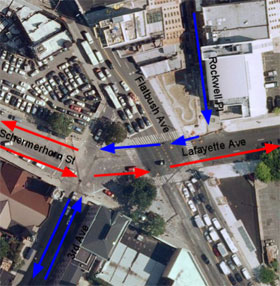Brooklyn CB2 Committee Seeks Better Fort Greene Bike Connections
The transportation committee of Brooklyn Community Board 2 voted unanimously Tuesday night to advance the idea of improving cycling connections between Fort Greene and surrounding neighborhoods. The proposal put forward by committee member Mike Epstein envisions safer bicycling across Flatbush Avenue and Atlantic Avenue, spanning intersections that are currently among the most dangerous in Brooklyn. A resolution asking DOT to study the plan’s feasibility is now expected to come up before the full board at a meeting next month.
 Mike Epstein’s proposal for new bike lanes (in blue) at the confluence of Flatbush, Lafayette, and Third Avenues. The full plan would create a safer, more cohesive network linking several neighborhoods.
Mike Epstein’s proposal for new bike lanes (in blue) at the confluence of Flatbush, Lafayette, and Third Avenues. The full plan would create a safer, more cohesive network linking several neighborhoods.The proposal would complete several missing links in the bike network connecting Fort Greene, Clinton Hill, Park Slope, and Prospect Heights. If implemented it would also improve bicycle access to East River crossings, especially the Manhattan Bridge, from several Brooklyn neighborhoods.
"The area between Fort Greene and Park Slope has been notoriously difficult
to ride through," said Aja Hazelhoff of Transportation Alternatives. "This would produce safer and more reliable corridors between neighborhoods."
The proposal calls for a new connection linking bike lanes on Ashland Place, Schermerhorn Street, DeKalb Avenue, Lafayette Avenue, and Third Avenue, including a contraflow segment across Flatbush and down a few blocks of Third where motor vehicle traffic travels northbound only.
To the east, where the Carlton Avenue bridge has been indefinitely closed to accommodate Bruce Ratner’s Atlantic Yards project, an extension of the Vanderbilt Avenue bike lane to Flushing Avenue would provide a much-needed alternate route across Atlantic.
The plan also envisions a new eastbound bike route on Lafayette Avenue and a Flushing Avenue connection linking Williamsburg’s new two-way, protected bike path and the approach to the Manhattan Bridge.
Council members Tish James and Steve Levin have signed on in support of the proposal. According to reports from Tuesday’s meeting, Downtown Brooklyn Transportation Coordinator Chris Hrones indicated that it’s increasingly common for DOT to receive and move forward with ideas that originate outside the agency.